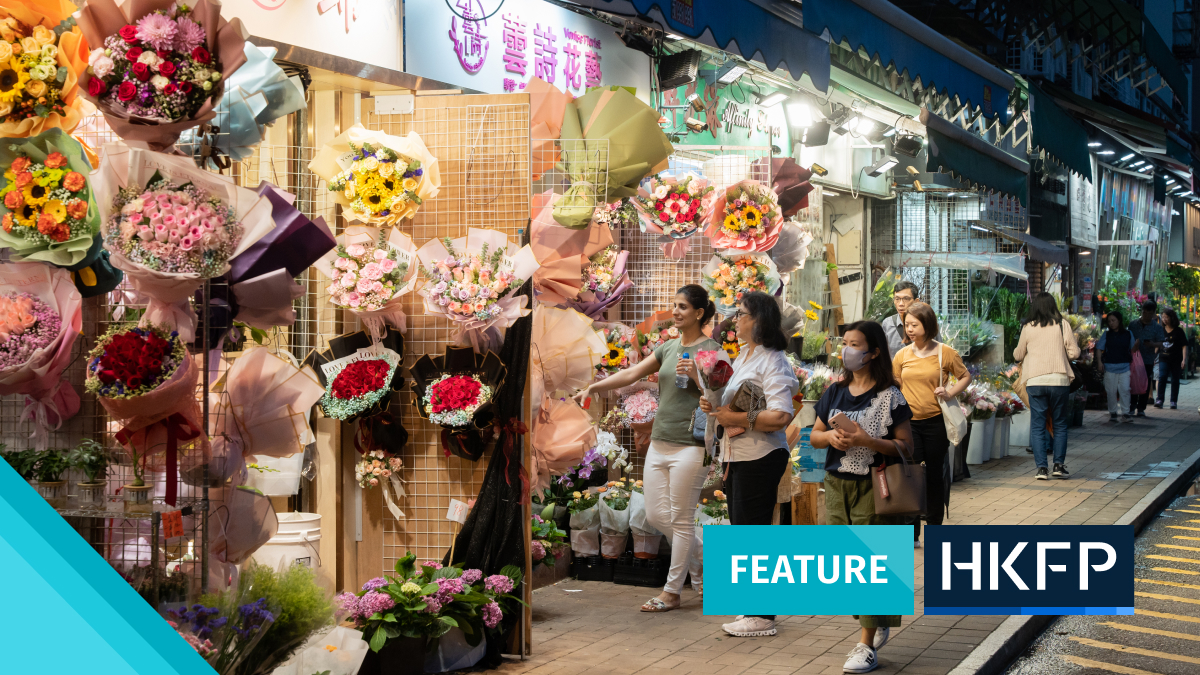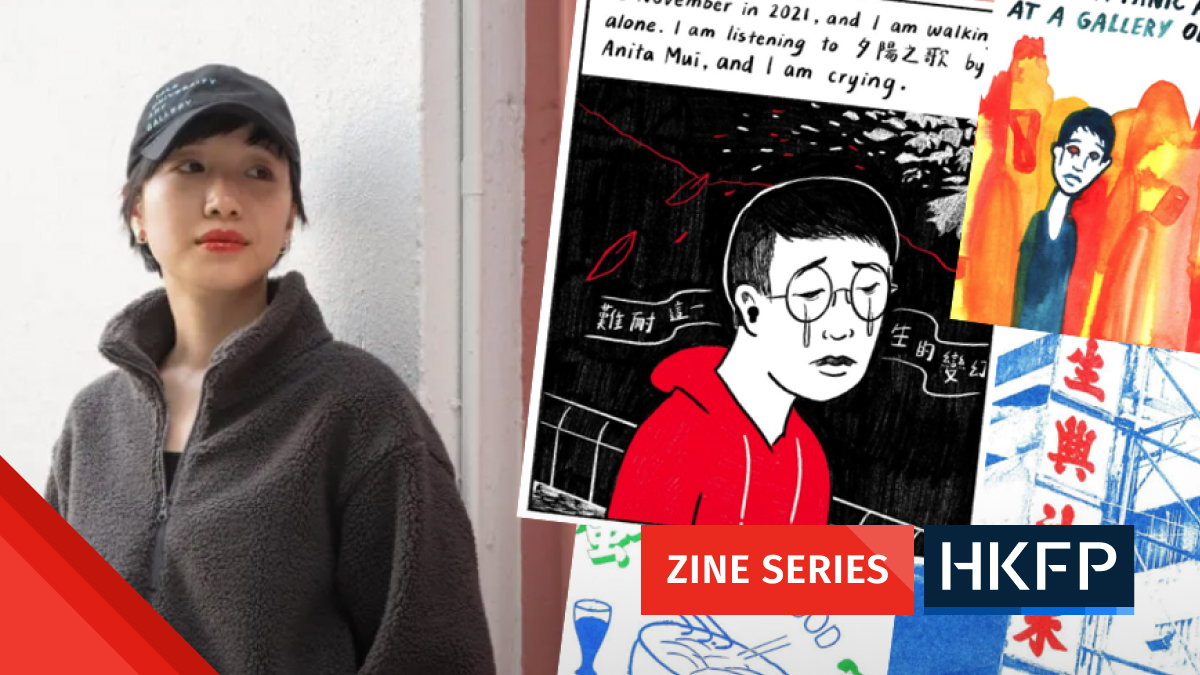Naila Ayesh was eight when Israeli forces demolished her family home in Lifta, on the outskirts of Jerusalem, in 1969. The event was a harbinger of a life of oppression to come in Israeli-occupied Palestine. But for the young girl, who was forced to grow up fast, her sense of resistance never faltered.
“It wasn’t a normal life for us,” the now 60-year-old told HKFP. For those who have grown up under occupation, it is difficult to fathom what a normal life is, beyond checkpoints, searches and military patrols.
Ayesh said that even a 17-kilometre journey to Jerusalem can take up to five hours to pass through the various Israeli control points.

Now, her story has been depicted in the hour-long documentary Naila and the uprising, which chronicles the life of Ayesh in the lead up to the First Palestinian Intifada from 1987 to 1993, of which she was part.
The brainchild of Brazilian director Julia Bacha, the film at times makes for uncomfortable viewing. Ayesh recounts, in painful detail, her first miscarriage following several beatings in an Israeli prison, her husband’s exile from Palestine, and her son’s upbringing, confined to the four walls of a prison cell with his mother, after she was arrested for demonstrating.
It is a harrowing story, beautified by intricate illustrations that depict a tale of bitter loss, resistance and unwavering hope.
HKFP met her at her hotel, where she is visibly tired from media interviews. In order to fly out to Hong Kong, she had to travel from her home in Ramallah to Jericho, where she lumbered across a heavily militarised border into Jordan and boarded a plane.
Buoyant but incisive, Ayesh tells her story with a zeal that makes it seems like it happened yesterday, only the violence she witnessed in the 1980s is still poignantly present today: two Palestinian protesters were shot dead by Israeli forces in the besieged Gaza Strip last Friday and, on Wednesday, it was reported that a Palestinian volunteer medic was killed by the Israeli army after they raided a refugee camp near the West Bank.
The conflict between the Jewish state of Israel and Arab-populated Palestine is an ongoing struggle that some argue began in the early 20th century over territory.
The 1967 war between Israel and neighbouring Arab countries left the Jewish state in control of the West Bank and Gaza Strip, largely populated by Palestinians. The two territories remain sites of continuing conflict between the two groups.

Naila and the Uprising takes a visceral look at the women behind the intifada who, faced with the pressure to provide under declining circumstances, must choose between their families and resistance against military occupation.
“We chose Naila’s story as the gateway to illustrate women’s leadership during the Intifada because it captures so much of a typical Palestinian woman’s experience – having to choose between family and the call to resistance while dealing with all the oppression of occupation, from prison to deportation,” Bacha told HKFP.
The director said she found out about Ayesh through word of mouth from activists involved in the intifada, adding that Ayesh was initially hesitant to participate in the film, but soon saw the value of sharing her story, although it was deeply personal and in some respects painful.
“Just like with movements for justice the world over, women’s involvement is far too often overlooked,” Bacha said. “That’s certainly the case in Palestine during the First Intifada. Women played monumental roles sustaining the uprising and developing strategies and tactics that made the nonviolent resistance more effective, and life during the uprising more bearable – especially by building community through agricultural cooperatives, underground schools, mobile clinics and the like.”
Naila and the Uprising was created by Just Vision and has been screened in dozens of cities across the world, including in Palestine and Israel.
‘The thief who stole our land’
Ayesh pulls no punches when describing life under Israeli occupation: “It is like they’re the thief who stole our land and our houses,” she said. “As occupiers, they think we are terrorists. But for me, they are the terrorists.”

Ayesh was spurred on further into political activism in 1982, not on the streets, but among peers in classrooms at the Academy of Science in Bulgaria, where she met her future husband, Jamal Zakout – a Palestinian.
The couple returned to Palestine and moved to Gaza, marrying in 1986 during a tense period in the lead up to the intifada. Ayesh became increasingly involved in grassroots organisations, joining NGO Save the Children as an officer for women and children.
“At that time to be active in any protest group was illegal,” Ayesh explained. “But for Palestinians, these are the places where they can discuss their ideas.”
It was not long until Israeli police came knocking on her door. Ayesh was detained for 45 days for her activism, suffering a miscarriage after she was beaten and initially denied medical treatment.
Following a public campaign headed by rights organisations, Ayesh was released, shortly before the start of the intifada. Naila and the Uprising uses archival footage that shows crowds of demonstrators who flocked to the streets in a series of explosive protests against the continued occupation.

Bacha takes pains to break the conventional image of the intifada as dominated by men throwing rocks and instead offers one that delicately depicts the strategic importance of women, who grew their own produce to boycott Israeli goods and established makeshift schools to replace those which had been closed down by the authorities.
“We as Palestinians feel from the inside that we are strong because we have the right to live here,” Ayesh explained. “They are the ones who aren’t strong because they have armies, guns and power.”
Zakout was exiled to Egypt in 1988, shortly before Ayesh gave birth to their son, Majd. Not long after she was arrested for her role in the uprising and thrown in jail under “administrative detention” for six months, along with her baby boy, who was eligible to stay with her because he was under the age of two.
Ayesh describes having to raise her son behind bars during his most fundamental years of development as traumatic. “The first tooth was in the prison. The first step was in prison,” she said. It is a difficult topic to broach for the steadfast activist, who has told her story many times, each no easier than the last.

Ayesh was released from prison half a year later and joined her husband in Egypt on the condition that she remain there for two years at the behest of Israeli authorities. It was only until 1994 that she returned to live in Gaza a year after the signing of the Oslo Accords – a set of international agreements that sought to ensure the right of the Palestinian people to self-determination.
But in spite of the peace treaty, relations between Israel and Palestine continued to deteriorate. “Things are going so bad, especially as Palestinians are not united anymore. Gaza is divided,” Ayesh said.
‘A normal life’
Ayesh dreams of what she calls a normal life. “This is not available to any Palestinians,” she explains. “If someone is sick they can go normally to the hospital. If you want to move from one village to another, you can move freely. I’m talking about the things we don’t have – free movement. There are checkpoints, clashes.”
“This is normal, for children to grow up hearing bombing, teargas, checkpoints,” she said. “It is unlike any country in the world.”
In a move in 2017 that incited anger among Palestinians, United States President Donald Trump declared Jerusalem to be the capital of Israel, sparking an international backlash and sounding the death knell for a two-state solution, according to Ayesh.

Looking to the future, Ayesh is cynical about a peaceful resolution without the support of the international community, who she said had been stymied by pro-Israeli efforts from the US to curtail a peace process.
“I think Palestinians have started to not believe in international law because of the silence of the international community,” she said. “They need to wake up, or else there may be a more bloody future to come of it.”
The Hong Kong Free Press #PressForFreedom 2019 Funding Drive seeks to raise HK$1.2m to support our non-profit newsroom and dedicated team of multi-media, multi-lingual reporters. HKFP is backed by readers, run by journalists and is immune to political and commercial pressure. This year’s critical fundraiser will provide us with the essential funds to continue our work into next year.

Support HKFP | Policies & Ethics | Error/typo? | Contact Us | Newsletter | Transparency & Annual Report | Apps
Help safeguard press freedom & keep HKFP free for all readers by supporting our team

Original reporting on HKFP is backed by our monthly contributors.
Almost 1,000 monthly donors make HKFP possible. Each contributes an average of HK$200/month to support our award-winning original reporting, keeping the city’s only independent English-language outlet free-to-access for all. Three reasons to join us:
- 🔎 Transparent & efficient: As a non-profit, we are externally audited each year, publishing our income/outgoings annually, as the city’s most transparent news outlet.
- 🔒 Accurate & accountable: Our reporting is governed by a comprehensive Ethics Code. We are 100% independent, and not answerable to any tycoon, mainland owners or shareholders. Check out our latest Annual Report, and help support press freedom.
- 💰 It’s fast, secure & easy: We accept most payment methods – cancel anytime, and receive a free tote bag and pen if you contribute HK$150/month or more.
MORE Original Reporting
HKFP has an impartial stance, transparent funding, and balanced coverage guided by an Ethics Code and Corrections Policy.
Support press freedom & help us surpass 1,000 monthly Patrons: 100% independent, governed by an ethics code & not-for-profit.









